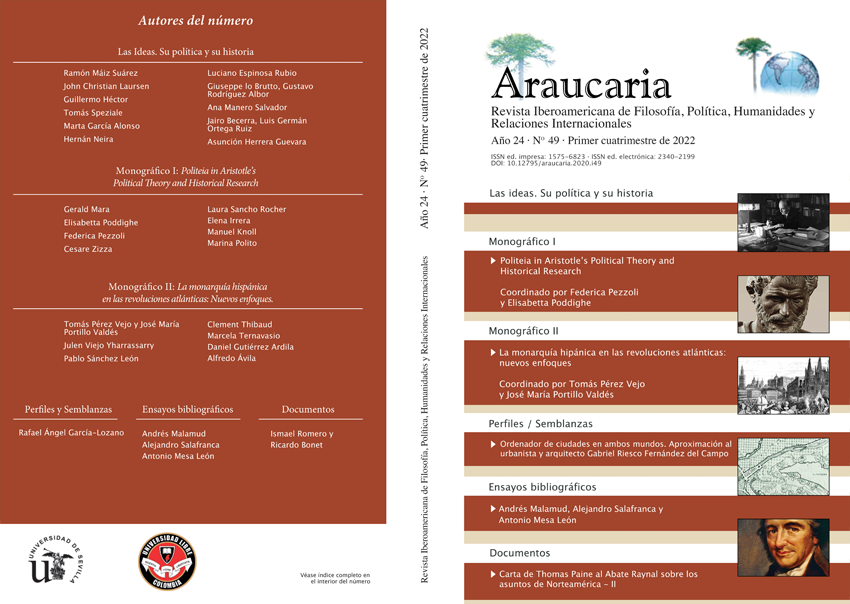Thomas Mann's Retreat from Irony in Politics
DOI:
https://doi.org/10.12795.02Keywords:
Thomas Mann, irony, politicsAbstract
Thomas Mann developed one of the most subtle theories of irony during World War I, concluding that the best irony was irony against both sides of any issue. Such irony was not inconsistent with love for humanity, and even for both sides. He may well have been justified in using irony against both sides in that war. But with the rise of the Nazis, he abandoned two-sided irony and used his irony mostly against them. One the one hand, this meant a better political position, but on the other hand irony was almost absent from many of his wartime essays and declarations. That may have been justified in such a time of danger, but it meant less art and subtlety in his political writings.
Downloads
References
Adorno, T. W. and T. Mann, Briefwechsel 1943-1955, eds. C. Gödde and T. Sprecher (Frankfurt: Suhrkamp, 2002).
Booth, W., A Rhetoric of Irony (University of Chicago Press, 1974).
Ferguson, N., The Pity of War (New York: Basic Books, 1999).
Horkheimer, M. and T. W. Adorno, Dialectic of Enlightenment (Stanford: Stanford University Press, 2002).
Laursen, J. C., “Thomas Mann y la espada de doble filo de la ironía en la política” in Nicolás Sánchez Durá, ed., Cultura contra civilización: En torno a Wittgenstein (Valencia: Pre-Textos, 2008), 57-66.
Mann, K., Unwritten Memories (London: Deutsch, 1975.
Mann, T., Past Masters and Other Papers (London: Martin Secker, 1933).
Mann, T., Order of the Day: Political Essays and Speeches of Two Decades (New York: Knopf, 1942).
Mann, T., Essays of Three Decades (New York: Knopf, 1947).
Mann, T., The Story of a Novel: The Genesis of Doctor Faustus, tr. R. and C. Winston (New York: Knopf, 1961).
Mann, T., Reflections of a Nonpolitical Man (New York: Ungar, 1983).
Mann, T., The Magic Mountain (New York: Vintage, 1995).
Mann, T., Essays, eds. Hermann Kurzke and Stephan Stachorski (Frankfurt: Fischer, 1996).
Mann, T., Thomas Mann: On Myself and other Princeton Lectures, ed. James Bade (Frankfurt: Lang, 1996).
Mann, T., Doctor Faustus (New York: Knopf, 1997).
Mann, T., Thomas Mann’s Addresses Delivered at the Library of Congress, ed. Don Heinrich Tolzmann (Bern: Lang, 2003).
Reed, T. J., “Mann and history” in Ritchie Robinson, ed., The Cambridge Companion to Thomas Mann (Cambridge University Press, 2002).
Schmidt, J., “Mephistopheles in Hollywood: Adorno, Mann, and Schoenberg” in The Cambridge Companion to Adorno, ed. T. Huhn (Cambridge University Press, 2004), 148-180.
Stock, I., Ironic Out of Love: The Novels of Thomas Mann (Jefferson: McFarland, 1994.
Vaget, H. R., “The Steadfast Tin Soldier: Thomas Mann in World Wars I and II” in Reinhold Grimm and Jost Hermand, eds., 1914/1939: German Reflections of the Two World Wars (Madison: University of Wisconsin Press, 1992).
Downloads
Published
How to Cite
Issue
Section
License
Las ediciones impresa y electrónica de esta Revista son editadas por el Secretariado de Publicaciones de la Universidad de Sevilla, siendo necesario citar la procedencia en cualquier reproducción parcial o total.Salvo indicación contraria, todos los contenidos de la edición electrónica se distribuyen bajo una licencia de uso y distribución “Creative Commons Atribución-NoComercial-SinDerivar 4.0 Internacional”








